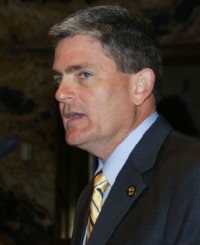One is a Sunday school teacher who sells piping to oil companies and represents a state House district in Lake Charles.
Another is a business consultant who has four small children and represents a district in Metairie.
The third is a real-estate developer in Mandeville with a bone-crushing handshake who represents a district in St. Tammany Parish.

Together, these three Republicans lead a conservative movement that has gained force in the Louisiana House of Representatives by calling out Gov. Bobby Jindal as a big spender.
The group, known as the Fiscal Hawks, will begin to flex its muscles again with the release of Jindal’s proposed $24.7 billion operating budget for fiscal year 2013 that, to the Fiscal Hawks’ dismay, would be kept in balance with $424 million in accounting gimmicks. Eliminating that money would lead to a 19 percent cut in funding for colleges and universities, according to the budget document.
The Fiscal Hawks note that Jindal has had to cut the budget midway through the fiscal year during each of his years as governor because the administration overestimated how much money it would have. The cut in December was $166 million. The Fiscal Hawks blame the accounting gimmicks for the midyear cuts, which they further oppose because the governor, not the Legislature, gets to make them.
The group consists of 30 House members – 29 Republicans and one independent – or enough to cause havoc for the governor as he tries to win approval for his budget in the 105-member House. Last year, the Fiscal Hawks got the House to eliminate one-time and contingency money from Jindal’s budget before the Senate restored it. Along the way, the group provided an embarrassing slap in the face to Jindal as he travels the country telling Republican groups that President Obama and the Democrats spend money the government doesn’t have.
Rep. Brett Geymann, the oil-pipe salesman from Lake Charles who leads the Fiscal Hawks, was asked why Jindal doesn’t support their efforts.
“We’re puzzled,” Geymann said. “I’m trying to think of a nice word. Is that a nice word?”

Rep. Cameron Henry, the business consultant from Metairie, was more blunt.
“No, he’s not a true conservative on fiscal matters,” Henry said of Jindal. “It’s not fiscally responsible to spend one-time money on recurring expenses. It’s not fiscally responsible or constitutionally allowed to have contingencies or one-time money in the state budget.”
In layman’s terms, the issue is akin to declaring one-time proceeds from sale of the family home as income that can be counted on annually for the foreseeable future.
The Fiscal Hawks are seeking to:
- Enshrine in the state Constitution a prohibition against the Legislature approving a budget that includes one-time money, whether the contingency money is already in hand or anticipated. As an example of the latter, critics cite Jindal’s 2012 budget, which he balanced by using a hoped-for $35 million from the then-pending sale of the New Orleans Adolescent Hospital, a deal that later was appraised at only $21 million. Instead, the budget could only include money certified as available by the state Revenue Estimating Conference.
- Open up the budget process by giving the House one to three days to study budget amendments approved by the Senate. The Legislature also would have to approve the budget two weeks before the session ends. These changes, which also would be enshrined in the Constitution, are aimed at preventing the last-minute slapdash approval of the budget without legislators having time to study its final contents.
The group spells out its ideas at labudgetreform.com.

The Fiscal Hawks filed a lawsuit in January alleging that Jindal’s budget last year violated the Constitution because it contained one-time spending and contingency money. The state court in Baton Rouge has yet to schedule a hearing, said Rep. Kirk Talbot, R-River Ridge, another Fiscal Hawk.
Other Fiscal Hawk leaders include Rep. Simone Champagne, R-Erath, Rep. Lance Harris, R-Alexandria, and Rep. Paul Hollis, R-Covington.*
The Fiscal Hawks present a vexing problem for Jindal because, despite his strong anti-spending credentials, he needs every dollar he can find to balance the budget, given his refusal to raise even the smallest taxes. His public approval has dropped recently, with analysts blaming his repeated cuts in spending for colleges and universities and for health care for the poor.
So-called “reform” groups are not new in the Louisiana Legislature. From 1968-72, during the final term of Gov. John McKeithen, House members dubbed the Young Turks successfully pushed the Legislature to ban lobbyists from the House floor, strengthen the House’s hand versus the governor and create clear rules of procedure for House committees and the entire body to follow when dealing with proposed legislation.
During the first term of Gov. Edwin Edwards, who followed McKeithen, a group of idealistic House members dubbed the Snake Hunt Group organized themselves to kill measures they believed were “snakes,” or against the best interests of the public.
But even within that legislative tradition, E.L. “Bubba” Henry, who served as a Democrat from Jonesboro, thinks the Fiscal Hawks are unusual.
”It’s not fiscally responsible to spend one-time money on recurring expenses. It’s not fiscally responsible or constitutionally allowed to have contingencies or one-time money in the state budget.”—Rep. Cameron Henry
“I don’t recall any reform group that is as well-targeted as this group appears to be,” said Henry, a Young Turk who served as House speaker during Edwards’ first two terms and has been a business lobbyist for the past 30 years. “These folks will have to be dealt with one way or another. I don’t think they can just be brushed off.”
The Fiscal Hawks showed that last year when, on a 51-49 vote, they got the House to purge the one-time and contingency money – a total of $267 million – from the $26 billion operating budget.
The Fiscal Hawks provided a general menu of suggested cuts to offset the $267 million. Senators and Jindal administration officials countered that the proposed cuts fell far short of $267 million. The Senate restored the money, and House Appropriations Chairman Jim Fannin, D-Jonesboro, and House Speaker Chuck Kleckley, R-Lake Charles, peeled away enough votes from the Fiscal Hawks to win final approval of the Jindal budget.
In that final House vote, a majority of Republicans rejected the budget. Republican committee chairmen – who owe their positions to the speaker and Jindal – joined with House Democrats to provide the margin of victory.
“It’s odd that a conservative Republican has to rely on Democrats to pass a budget,” said Rep. John Schroder, R-Covington, the real estate developer.
U.S. Sen. David Vitter and state Treasurer John Kennedy – both Republicans – praised the Fiscal Hawks. A conservative blogger in Louisiana, Scott McKay, took Jindal to task.
The inability to explain how they would offset the lost revenue – without raising taxes – is the major obstacle the Fiscal Hawks face.
“Their concerns are legitimate,” said state Sen. Danny Martiny, R-Kenner. “But you need to find a way to avoid cutting all the services.”
Senate President John Alario, R-Westwego, said the Fiscal Hawks are engaged in a “worthy cause,” but said: “They have to tell us where the cuts are. The best approach would be for them to submit an amendment in the Appropriations Committee or on the House floor for the specific cuts.”
Asked if he might join the Fiscal Hawks’ movement, Alario said, “I do not support further cuts in education. We’ve cut enough.”
Despite the ultimate defeat, last year’s developments showed that the Fiscal Hawks had arrived as a political force.
“They are the only significantly sized group in the Legislature that has proposed something Bobby Jindal doesn’t support,” said C.B. Forgotston, a budget expert from his days as a legislative budget attorney who has consulted informally with the group and who is credited with giving them their name in his widely-read political blog
Added Lane Grigsby, owner of a Baton Rouge construction company and a major donor to conservative political causes: “Sometimes you got to tell the emperor that he’s got no clothes.”
A request for an interview with Jindal or a senior administration official about the Fiscal Hawks went unanswered.
Following last year’s defeat, the Fiscal Hawks raised $33,000 – mostly from themselves – and began meeting with interest groups throughout the state, in an attempt to build grass-roots support for their effort. There’s no evidence that they have succeeded.
Robert Travis Scott, president of the Public Affairs Research Council, and Barry Erwin, president of the Council for a Better Louisiana, expressed general support for the Fiscal Hawks’ efforts but stopped short of endorsing their specific measures. The Public Affairs Research Council and the Council for a Better Louisiana are centrist think tanks based in Baton Rouge.
Melissa Flournoy, a former Democratic state representative who heads Louisiana Progress, a group that favors greater government spending, said the Fiscal Hawks have “honorable intentions but are misguided.”
The group also has yet to win the public support of any House Democrat or any senator, Democrat or Republican. The Legislature will not approve their measures without support from a majority of senators and Jindal.
Jindal has never met with the Fiscal Hawks face-to-face to discuss their proposals.
The Fiscal Hawks met with Jindal chief of staff Paul Rainwater in early January. Rainwater said he would get back to them, Geymann said, but they have not heard from him.
The Fiscal Hawks met with Fannin and Kleckley on Monday.
“It opened up the lines of communication,” Geymann said, but “there was no commitment on their part.”
Fannin did not return a phone call seeking comment.
Geymann, Henry and Schroder all said they wished the governor — currently committed to revamping the state tax code — would make their package his legislative priority in the coming session. None of the three said he is planning to seek Jindal’s support for their budget package in exchange for their votes on the tax package, which needs a two-thirds majority in the Legislature.
Schroder noted that if Jindal did support their budget package and it won approval, the legislature would have to specify the cuts, rather than leaving the Jindal administration to make them mid-year.
“We can blame it all on the governor now,” Schroder said. “If we could get our way, it would put more burden on the legislative body.”
*Correction: The original version of this story incorrectly named Rep. Lance Harris and misstated Jim Fannin’s political party.


